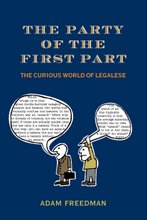
President Bush’s decision to commute the sentence of Lewis “Scooter” Libby left many Republicans hankering for a full pardon. So, what’s the difference?
To commute a sentence is to substitute a less severe punishment for the one originally imposed – but some punishment is still meted out. In Libby’s case, the President commuted the jail time, but left the fine and probationary sentence intact. A pardon, on the other hand, releases the convicted person of all punishment flowing from the offense.
Commute comes from the Latin commutare (to alter), and is related to such words as transmute and mutation. Commuting is all about changing; for example, changing places. In the late nineteenth century, the railroads referred to season train passes as “commutation tickets.” Before long, the people who made use of those tickets became known as commuters.
The criminal law sense of commute is recorded as early as 1642, when British Scholar Thomas Fuller observed that some courts had a custom of “commuting whipping into money.” In the eighteenth century, commercial lawyers began using commutation to refer to the conversion of a periodic payment into a lump sum.
Pardon comes from French (as in pardonez moi) and ultimately from the Latin prefix per plus donare, or “to give.” As reflected in the word’s etymology, a pardon amounts to a gift to the offender. But even with a pardon, the conviction remains on the record, unless it is – now here’s a legal word – expunged.
Both commutation and pardon are examples of executive clemency: the power of presidents and governors to offer varying degrees of forgiveness to those convicted of crimes. Clemency comes from the Latin clementia, which means “forbearance,” but which also means “mildness” – from which we get the word clement to describe mild weather, and its opposite, inclement.
The President’s commutation order may be an example of clementia, but the political reaction suggests stormy weather ahead.


No comments:
Post a Comment